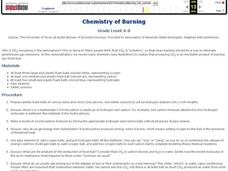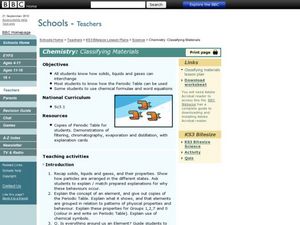Royal Society of Chemistry
Common Compounds
Can your young chemists identify the most commonly used chemicals in the lab? Introduce the class to the go-to substances in most middle and high school chemistry experiments with an interactive. The resource offers timely feedback as...
Curated OER
Chemistry of Burning
Students look into the increase of carbon dioxide in the atmosphere. In this chemistry lesson, students look at the hydrocarbon molecule through a model and see what happens when energy is released. They watch as the water vapor leaves...
Curated OER
Chemistry: Classifying Materials
Young scholars classify materials. In this chemistry lesson, students examine the properties of solids, liquids, and gases. Young scholars discover the elements, compounds, and chemical symbols.
Curated OER
Fred the Fish -- A River Ran Wild
Students apply cause and effect relationships to water pollution in a stream. For this pollution lesson students recognize the importance of clean water in their daily lives. Students accompany "Fred the Fish" as he travels down stream....
Curated OER
Ups and Downs of Diving
Students explore the science and sport of scuba diving. In this scuba diving lesson, students build Cartesian divers and observe their behavior under water pressure.
Curated OER
How Much Do I Know About Water?
Sixth graders explore how water behaves on a penny. In this states of matter lesson, 6th graders observe water as they add drops to a penny. This lesson helps students apply the adhesive properties of water to the water cycle.
Curated OER
Water, Water Everywhere
For this water worksheet, students complete a five question multiple choice online interactive quiz about water. This is a more advanced quiz that includes chemistry questions.
Curated OER
What Changes Occur When Water Freezes?
Students investigate the changes that occur at the molecular level when a liquid becomes a solid. They freeze water in baby jars and observe the changes that occur in the process.
Texas Instruments
Endothermic and Exothermic Processes
Students investigate temperature using the TI. In this chemistry lesson, students analyze the change in temperature, as chemicals are dissolved in water. They analyze data collected using the CBL 2.
Curated OER
Ziplock Chemistry
Students investigate various chemical reactions when creating mixtures in ziplock baggies. In this chemistry lesson, students will recognize various chemical reactions and cite evidence. Safety and assessment strategies are included in...
Curated OER
Pop Rock Chemistry
In this pop rock chemistry worksheet, learners suck on pop rocks, they mix open pop rocks with water and they observe them on a paper towel with water. Students write down as many observations as they can and they write down as many...
Curated OER
Basic Vitamins: Water-Soluble and Fat-Soluble
An incredibly thorough lesson on vitamins, and how to keep one's body at peak health. Learners access a variety of excellent worksheets embedded in the plan that have them consider raw vs. cooked foods, a vegetable nutrition summary,...
Curated OER
Where Did the Water Go? An Investigation in Scientific Methods
Students hypothesize what happened to the missing water. In this chemistry lesson, students test their hypothesis by designing an experiment. They record observations and report findings to class.
Curated OER
Water Quality
Students play the role of scientists testing for water quality in the area. In this ecology instructional activity, students determine the water sample's pH, temperature, dissolved oxygen and turbidity. They write a journal reflection...
American Chemical Society
Molecules in Motion
I heard that oxygen and magnesium were going out and I was like "O Mg." Pupils experiment with adding food coloring to water of various temperatures in order to determine how temperature impacts molecular movement. This is the...
NOAA
Ocean Zones
How can organisms light up in water? Bioluminescence is light produced in a chemical reaction that can occur in an organism's body. First, learners determine what happens to light/color as you move into the deep ocean. In groups, they...
Curated OER
Fuel Cell Experimentation
With rising oil prices and increasing concerns over global warming, the pressure is on for engineers to develop alternative sources of energy. Among the new technologies being developed are hydrogen fuel cells, which young scientists...
Cornell University
Nano Interactions
Tiny particles can provide big learning opportunities! Middle school scientists explore the world of nanoparticles through reading, discussion, and experiment. Collaborative groups first apply nanotechnology to determine water...
Curated OER
Mixing Dissolving Quiz
Answer true or false to get through this 11 question quiz on mixing and dissolving. Budding chemists who know their stuff will have no problem determining which dissolving and mixing questions are correct. A basic quiz on the basic...
Curated OER
Ice Cream in a Bag
Here is a good version of this classic chemistry activity. Learners are given a simple recipe for how to make home-made ice cream by putting all of the ingredients into a ziploc bag. Before doing the activity, I would recommend having a...
Curated OER
Science Crossword Puzzle
Class members read 25 clues about all areas of science, including biology, chemistry, weather, physical science, and insert their answers into a crossword puzzle. There is no word bank and the learners would need experience with tough...
Curated OER
Activity #4 Ground Water Model In a Jar
Students devlop a model, which they illustrate a water table and allow for the discussion of common terms and illustrate what those terms mean. They comprehend that a flow rates, removal of contaminants, and the amount of water stored...
American Chemical Society
Changing State: Freezing
There are five types of frost: ground frost, air frost, hoar frost, glaze, and rime. Scholars mix ice and salt in a metal container to observe frost forming on the outside of the can. Animations and videos enhance the learning.
Curated OER
Electrolysis
Students conduct a series of experiments on water electrolysis. In this chemistry lesson, students explain what happens to the molecules during the process. They cite real world applications of electrolysis.
Other popular searches
- Lake Water Chemistry
- Water Chemistry Ions
- Co2 Water Chemistry
- Water Chemistry Lesson Plans
- Ocean Water Chemistry
- Basic Water Chemistry
- Water Chemistry Properties
- Storm Water Chemistry
- Marine Water Chemistry
- Size vs. Water Chemistry
- Chemistry of Water
- Water Chemistry Nitrate























